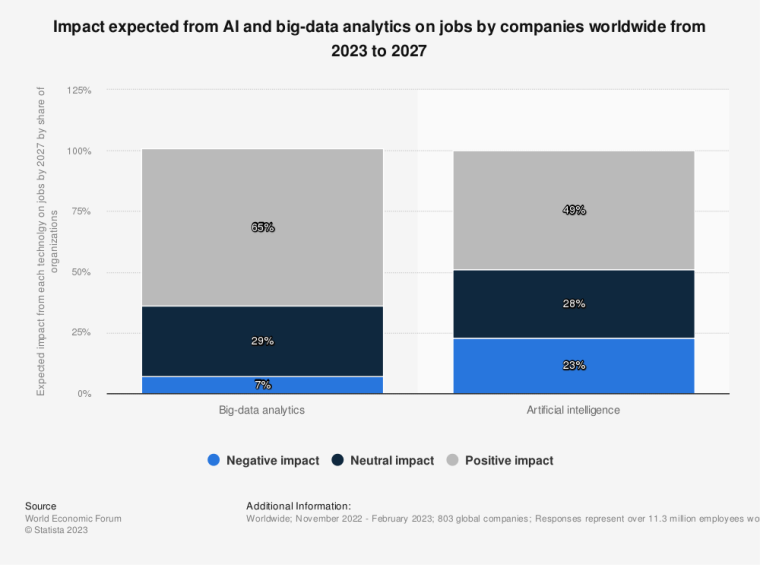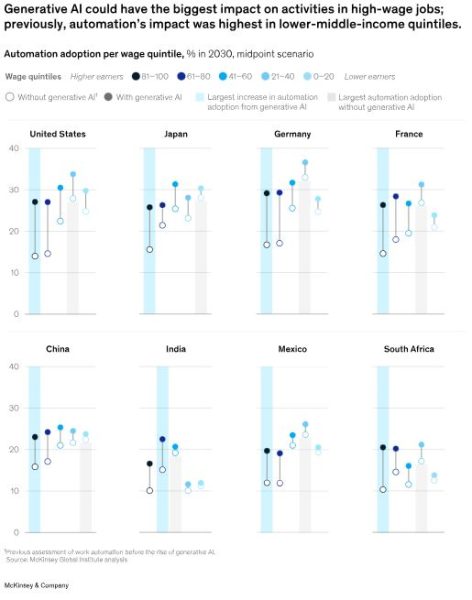
In the past year, worldwide searches on Google for the keyword “generative AI” have hit the popularity scale of 100, an all-time high as talks about the potential of the technological development continue to take over media headlines.
The potentials of artificial intelligence (AI) have been discussed countless times. Ranging from enhancing productivity and efficiency across a number of industries to transforming transportation, finance, education and even addressing complex global challenges such as climate change and poverty.
However, a report published by McKinsey & Co on 14 June brought up some startling news – generative AI could affect knowledge workers more than any other sector, and this is not in a good way.
Generative AI Could Surge Productivity by $4.4 trillion
According to the report, generative AI has the potential to increase labour productivity by $2.6 to $4.4 trillion annually.
What’s the value and impact of #generativeAI? Companies across countless industries are already experimenting with its applications. Our new research has found that the value at stake is huge–potentially $2.6 to $4.4 trillion in #productivity annually➡ https://t.co/pY5ACuvoL1 pic.twitter.com/ecZ0RvtzHl
— McKinsey & Company (@McKinsey) June 14, 2023
Generative AI has the potential to address specific business challenges, yielding measurable outcomes in customer operations, marketing and sales, software engineering and research and development.
Moreover, it has the potential to transform the nature of work, boosting the skills of individual workers and making them more productive and efficient. AI’s ability to process large amounts of data could be beneficial for e-commerce companies, while the development of chatbots has been assisting businesses globally in staying connected with their customers around the clock.
And while the pace of workforce transformation is likely to accelerate through the creation of generative AI, the technological advancement also serves as a potential threat to certain careers.
According to a Statista report, between 2023 and 2027 49% of companies surveyed expected generative AI to create more jobs. Meanwhile, 23% believed it would displace jobs.
Generative AI poses threat to white-collar knowledge workers
Research conducted by the McKinsey Global Institute (MGI) in 2012 estimates that knowledge workers devoted around one day a week to search for and gather information. In total, this accounts to about a fifth of their overall working time.
If generative AI were to assume these tasks, it could significantly enhance the efficiency and effectiveness of workers, resulting in substantial benefits, but also risks. Especially since the report found the current capabilities of generative AI and other technological developments have the potential to automate work activities that currently consume between 60-70% of employees’ time.
In the future, generative AI has the potential to disrupt jobs held by higher-earning workers, which were “previously considered to be relatively immune to automation”.
On top of that, the report has noted that generative AI could potentially disrupt the significance of obtaining a number of higher degree credentials as a reliable indicator of professional skill.
Should We Be Afraid of Generative AI Taking Our Jobs?
Generative AI anxiety is real, however, a CNCB survey found that the majority of workers in the US are not afraid of losing their jobs due to artificial intelligence.
In a testimony before Congress on 16 May, OpenAI’s CEO, Sam Altman, has noted that as with any other technological developments, generative AI could have a “significant impact on jobs”.
“You know, we do believe that ai, and we’ve said it for a long time, is gonna change every job. New jobs will be created. Many more jobs will be transformed and some jobs will transition away.”
The founder of Learn Promoting Pro, Daniel Nikolovski, told Business2Community that generative AI’s ability to augment human capabilities will allow knowledge workers to focus on higher-level tasks and priority thinking.
“In the long run, fostering collaboration between AI and human expertise will be the key to unlocking the full potential of this technology while mitigating job loss risks,” he added.
Related Articles:
- The Dark Side of Generative AI: Fostering Science Denial and Undermining Democracy
- Breaking Down the Carbon Footprint of Generative AI
- Best AI Stocks to Invest in 2023
What's the Best Crypto to Buy Now?
- B2C Listed the Top Rated Cryptocurrencies for 2023
- Get Early Access to Presales & Private Sales
- KYC Verified & Audited, Public Teams
- Most Voted for Tokens on CoinSniper
- Upcoming Listings on Exchanges, NFT Drops

